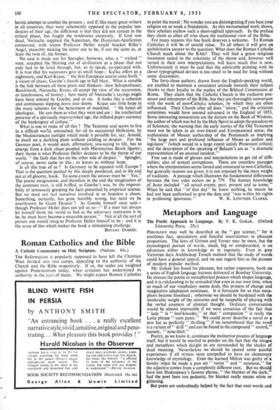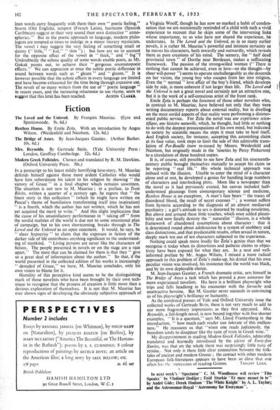Metaphors and Language .
PHILOLOGY may well be described as the " gay science," for it combines fact, speculation and fanciful uncertainties in pleasant proportion. The laws of Grimm and Verner may be stern, but the etymological pursuit of words, small, big or compounded, is an adventure either in knowledge or in ingenuity. Even in grey Victorian days Archbishop Trench realised that the study of words could have a general appeal, and we can regard him as the pioneer of modern popular method.
Mr. Gokak has based his pleasant, but rather expensive, book on a series of English language lectures delivered at Bombay University. He stresses the poetic or metaphorical process which shapes language, and it is exhilarating to be reminded that even in our own time, when so much of our vocabulary seems drab, this process of change and imaginative adaptation continues. It is fortunate for us that meta- phors become fossilised ; otherwise we should be burdened with the intolerable weight of the centuries and be incapable of playing with the verbal counters of abstract thought. Ordinary conversation would be almost impossible if we were conscious of the fact that " lady " is " loaf-kneader," or that " companion " is really the Latin phrase " cum panis." We could never describe a novel or a new hat as perfectly " thrilling " if we remembered that the word is a variant of " drill " and can be found in the compound " nostril," namely, " nose-thirl."
Poetry, as we know it, continues the instinctive process of language itself, but it would be morbid to ponder on the fact that the images and metaphors which delight us are surrounded by the shades of dead meaning. Nevertheless we should be spared some painful experiences if all writers were compelled to have an elementary knowledge of etymology. Even the learned Milton was guilty of a howler when he made a ,pun on " raven " and " ravenous," for the adjective comes from a completely different root. But we should have lost Shakespeare's famous phrase, " the blanket of the dark," had the poet been too pedantic, for blanket really means white or . glittering.
But poets are undoubtedly helped by the fact that root words and loan words carry frequently with them their own " poetic feeling." Storm (Old English), tempest (French Latin), hurricane (Spanish Caribbean) suggzst in their very sound their own distinctive " atmo- spherics." But in the poetic approach to language, modern philo- logists are tempted at times to indulge in a minor literary mysticism. The vowel i may suggest the very feeling of something small or dainty (" little," " kid," " slim ") ; but how are we to account for the opposite effect of the vowel in " thick," and " big"? Undoubtedly the echoic quality of some-words enable poets, as Mr. Gokak points out, to achieve their " gorgeous onomatopoeic effects." We can appreciate at Once the subtle poetic difference in sound .between words such as " gleam " and " gloom." It is however possible that the echoic effects in every language are limited and have become exhausted for the time being through excessive use. The revolt of so many writers from the use of " poetic language " in recent years, and the increasing reluctance to use rhyme, seem to suggest that this limit has been reached. AUSTIN CLARKB.



































 Previous page
Previous page